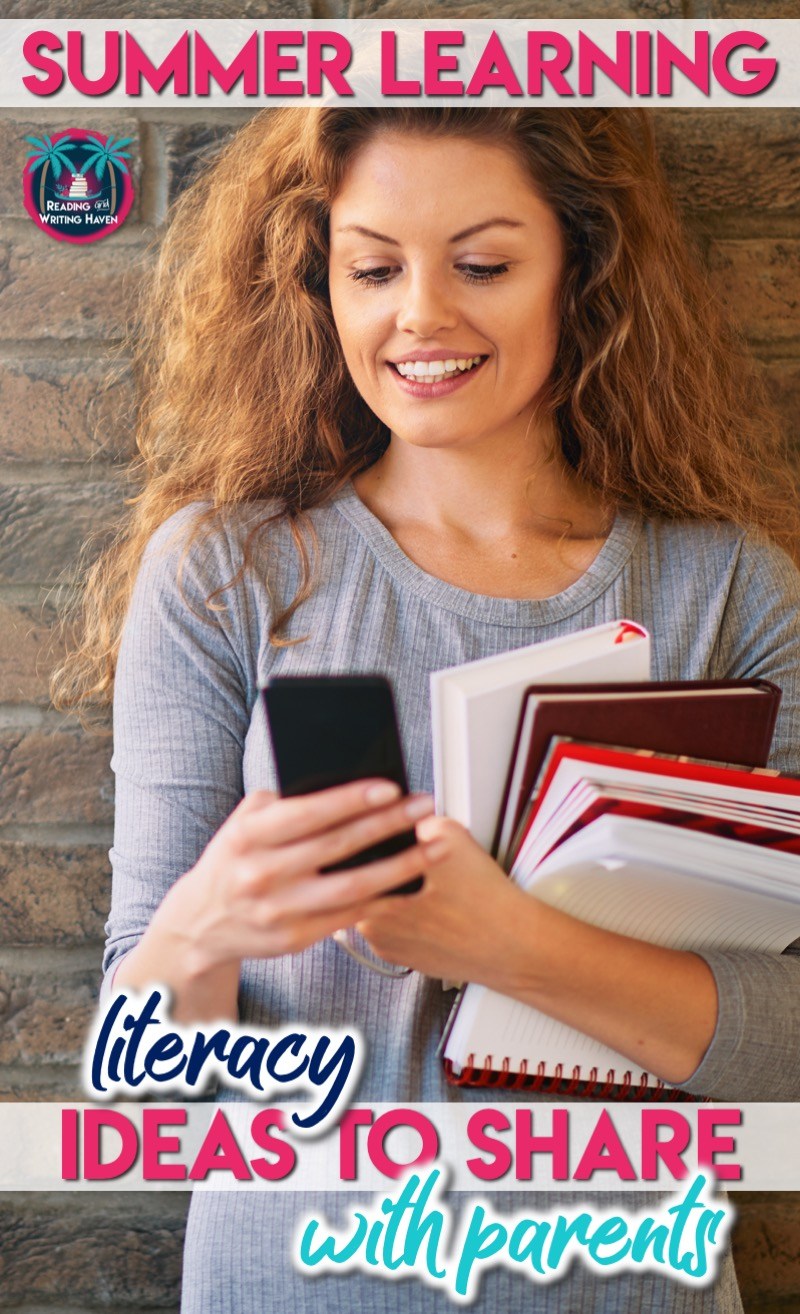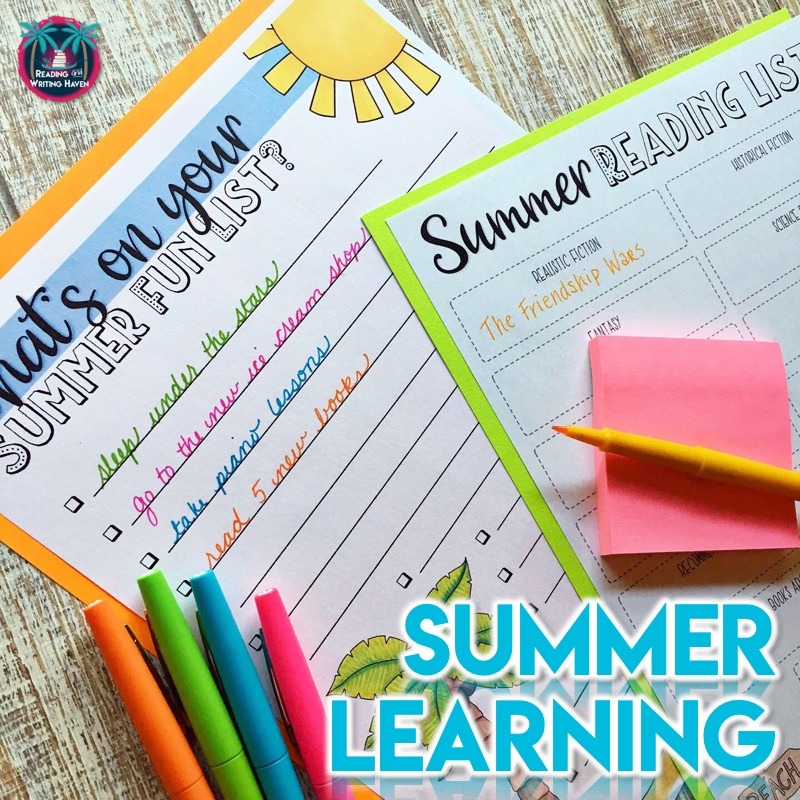Summer Learning Activities: How Teachers Can Support Parents
Looking for meaningful summer learning activities for teens? This post contains rewarding ideas for working with older students during the summer months.
It’s the end of the year. You’ve made so much progress with students, but summer break is quickly approaching. Along with it looms the threat of the summer slide.
Research has proven that students benefit from meaningful learning activities over the summer months. Time students spend reading and writing over extended breaks helps to address achievement gaps. Also, it can lessen the amount of time teachers have to spend re-teaching material in the fall.
Teachers can help parents get started with summer learning by providing inspiration and tools for success. What might that look like?
Reading over the Summer
Make Lists
Many parents request recommended reading lists. What books does my child need to read to be ready for the next level of schooling? Everyone has their own answer to this question. Teachers can help parents by preparing a list of books. If you teach 8th grade, what do you know about the high school curriculum? Are there any books ninth grade teachers talk about often?
If you aren’t certain, ask! For instance, many high school teachers talk about The Hunger Games, The Outsiders, and The Glass Castle. Try to avoid recommending books you know students will read in future years. Instead, think about books that would help them to recognize allusions and that would help them, overall, be more prepared for the type of literature they will read.
Teachers can also invite students to help with list generation. Brainstorm summer reading lists by having students nominate their favorite books from the school year or ones on the top of their “to read soon” list.
Trouble Shooting
Parents have asked me, What do I do? My child hates reading. There’s no easy fix for this problem, but teachers can pass along some tips for developing a positive reading environment at home. While they work well for conferences and meet the teacher night, you can also send them home at the end of the school year.
Talking about Books
We can’t expect parents to know how to teach reading like we do at school. What helps the most is supporting parents so that they have some ideas about what types of questions to ask students in order to spark conversation.
- Who is the main character? Would you be friends with him or her? Why?
- What is the major problem in the story? Does it remind you of anything you’ve experienced? Why?
- Is the setting at all like the setting of your life? Tell me about it.
Some of the best bookish questions for parents to ask are the ones that give them a foot in the door to building a stronger relationship with their child.
Book Access
Some sources recommend teens read at least 4 to 5 books over the summer to prevent significant reading skill decline. To make that happen, students need to have access to books over the summer. Communicate with parents so that they know where, when, and how to affordably find books for their children. If possible, give students at least one book to take home. Open the school library for family events during the summer months, or host some at the public library. You might also try creating and stocking Little Free Libraries. Donalyn Miller and Colby Sharp co-authored a book called Game Changer that has additional ideas.
Writing over the Summer
Help parents support their teens’ writing experiences at home by answering some key questions…
When?
One of the most challenging parts of writing over the summer is figuring out how to fit it in naturally…and semi-regularly. Sure, some parents will hire a tutor. But, that’s not the only way to keep writing skills fresh. The best summer writing experiences include an authentic audience and topics teens really love.
Parents of older students often want to help their teens at home but aren’t sure how often or when to ask them to write. Send home some communication so that parents know how to best partner with you.
How?
As a parent myself, the last thing I want to do is nag my child over the summer and turn writing into a less-than-desirable activity. So! I find ways to make writing fun by leveraging what my children enjoy most. For instance, my son loves graphic novels. So, I bought him this blank comic book. He’s really started to run with it, and it has not required any prompting on my part. My daughter has just started enjoying diaries. Think about the genres your students like, and communicate what you know with parents.
Encourage parents to get creative. They can take their teens or tweens to the beach or a park and allow them to do some descriptive or creative writing. Teens could start a travel journal, a blog, or an email chain with a family member who lives far away.
Parents can work with children who favor video games as well. Let’s pretend Jacob loves Minecraft. He could start a vlog detailing his knowledge. Videos might include creating tutorials, talking about his experiences, and teaching others how to play. All of these topics can begin with pre-writing. Parents can help their teens understand the value of organizing ideas before vlogging.
Find a list of summer writing ideas to share with parents here.
What?
Make sure parents know where they can find good writing topics to use at home.
Some students appreciate traditional writing prompts, like these from Scholastic. To make this approach even more interesting, have your students brainstorm possible summer writing topics, and compile them into a list. You can email them to parents or print them and send them home.
Here are some of my other favorite sources for writing topics to use at home:
- John Spencer’s video writing prompts for students
- The New York Times picture prompts to inspire student writing
- Ted-Ed’s 20 creative writing prompts you can do in 10 minutes
- CNN-10 – students can watch, ask questions, and respond!
- Short films – watch and write a prequel or sequel
Why?
Let parents know that writing is an excellent enrichment activity. The more students read and write, the better they become! Many local community colleges offer college for kids classes, which are great opportunities for summer learning. For instance, once of the colleges near me is offering a Harry Potter experience, a play writing and performing seminar, and a couple different writing skills and genres courses.
I think it’s important that teachers respect the time students have at home with their families, so I wouldn’t suggest that any summer learning activities are burdensome. Instead, teachers can help parents find meaningful and light reading and writing activities that encourage bonding between family members.
For more fun ideas to support summer learning and decrease the summer slide, you can read this post.
Also, Lauralee at Language Arts Classroom is sharing her experiences with sharing reading and writing with teenage students over the summer months. Read about holiday cards, scrapbooks, and library programs here.
RELATED RESOURCE:
This resource contains tools you can use with students to prepare for summer learning. It includes a summer reading list, questions to discuss with readers at home, tips for incorporating writing, and other tools to support parents. Also find a recommended reading list for middle and high school and editable letters to send home to parents.


